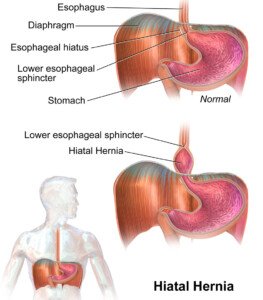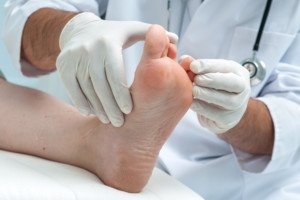Right upper abdominal pain is scary because that’s where the liver, pancreas and gallbladder are.
But can a hiatal hernia cause pain in the right upper quadrant of the abdomen?
After all, it would be more reassuring to the sufferer of this pain if it were being caused by a typical hiatal hernia than by liver cancer or pancreatitis.
Many things can cause right upper abdominal pain, including harmless gas bubbles – which can actually be quite painful.
Occasional discomfort in the right upper abdominal area may be caused by muscle spasms or irritated nerves from exercise, or from inflamed cartilage between the ribcage.
Hiatal Hernia and Abdominal Pain
“No, hiatal hernia is not a typical cause of right upper abdominal pain,” says Santosh Sanagapalli, MD, a consultant gastroenterologist, endoscopist and specialist in esophageal disorders.
“There is a much less common type of hiatal hernia that can cause chest and abdominal pain, called a paraesophageal hiatal hernia.
“The pain can be felt in the central chest or in the center of the upper abdomen (epigastric region).
“Such hernias often also cause difficulty swallowing, and are easily diagnosed on endoscopy, CT scan or barium swallow.
“When a paraesophageal hernia is determined to be present and causing such symptoms, it generally needs to be surgically repaired.”
The More Common Hernia

BruceBlau
“The majority of hiatal hernias are asymptomatic, and most patients with hiatal hernias would not even know they have one since they feel well,” says Dr. Sanagapalli.
“The main significance of hiatal hernias is that they predispose to developing GERD (acid reflux) by disrupting and weakening the anti-reflux barrier between the lower esophagus and stomach.
“Therefore, the most common symptoms in patients with a hiatal hernia are heartburn and regurgitation of acidic fluid. Sometimes, chest pain can be a manifestation of GERD in these patients.”
If you’ve been diagnosed with a hiatal hernia and are experiencing recurring pain in the upper right region of your abdomen, this may very well be another – and unrelated – condition, such as gallstones.
Don’t just assume it’s from the hiatal hernia. Have your doctor order tests to investigate possible causes.


 Dr. Sanagapalli
Dr. Sanagapalli












